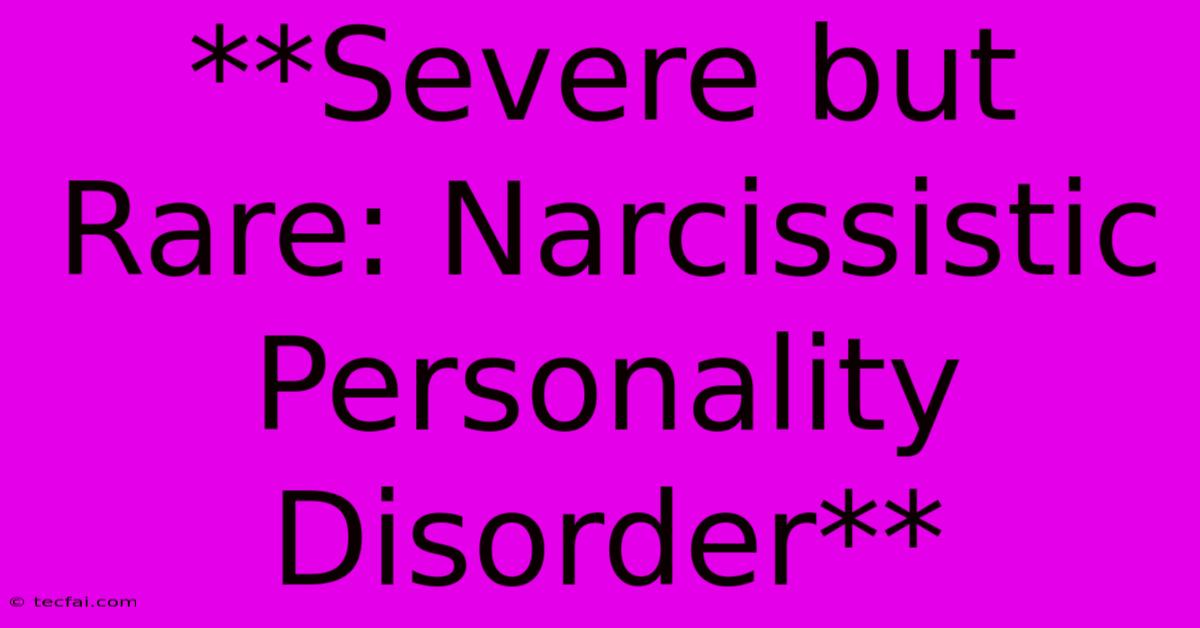**Severe But Rare: Narcissistic Personality Disorder**

Discover more detailed and exciting information on our website. Click the link below to start your adventure: Visit Best Website tecfai.com. Don't miss out!
Table of Contents
Severe but Rare: Narcissistic Personality Disorder
Narcissistic Personality Disorder (NPD) is a mental health condition characterized by an inflated sense of self-importance, a deep need for admiration, and a lack of empathy for others. While the term "narcissist" is often thrown around casually, true NPD is a serious and complex disorder that affects approximately 6.2% of the population.
Understanding the Nature of NPD
Key Characteristics:
- Grandiose sense of self-importance: They believe they are special and unique, deserving of exceptional treatment and admiration.
- Preoccupation with fantasies of success, power, brilliance, beauty, or ideal love.
- Need for excessive admiration: They crave constant attention and praise, feeling entitled to it.
- Lack of empathy: They struggle to understand and share the feelings of others, often dismissing or devaluing their experiences.
- Envy of others: They often resent the success and achievements of others, believing they are unfairly deprived.
- Arrogant and haughty behaviors: They come across as condescending and dismissive, expecting special favors and preferential treatment.
The Root of the Problem:
While the exact cause of NPD is unknown, research suggests a combination of genetic predisposition and environmental factors may play a role. Early childhood experiences, such as parental neglect or overindulgence, can contribute to the development of the disorder.
The Impact of NPD on Relationships and Society
Individuals with NPD can have a profound impact on their relationships, often leaving their loved ones feeling drained, manipulated, and emotionally abused. Their need for control, lack of empathy, and constant need for validation can create a toxic environment.
Examples of NPD in Relationships:
- Exploitation and manipulation: They use others to achieve their goals, often taking advantage of their vulnerability.
- Jealousy and possessiveness: They feel threatened by other people's success and attention, leading to jealous outbursts and controlling behaviors.
- Frequent blaming and criticizing: They are quick to blame others for their own shortcomings, refusing to take responsibility for their actions.
- Difficulty with intimacy: Their fear of vulnerability and need for control make it challenging for them to form healthy, intimate relationships.
NPD can also impact society in various ways:
- Workplace conflicts: Their inflated sense of self-importance and inability to collaborate can lead to conflict and tension within work environments.
- Legal issues: They are prone to impulsive behavior and disregard for rules, which can result in legal troubles.
- Social isolation: Their lack of empathy and need for admiration can lead to difficulty maintaining healthy social connections.
Seeking Help and Treatment
While NPD can be challenging to treat, therapy can help individuals gain insight into their behaviors and develop coping mechanisms. Cognitive Behavioral Therapy (CBT) is often used to help individuals identify and change their negative thought patterns and behaviors.
It's important to remember:
- Therapy can be a long and challenging process.
- Individuals with NPD may not be receptive to treatment.
- Seeking professional help is crucial for both the individual with NPD and those affected by their behavior.
If you suspect someone you know has NPD, it is crucial to:
- Set healthy boundaries: Protect yourself from their manipulation and exploitation.
- Focus on your own well-being: Prioritize your emotional and mental health.
- Seek support from trusted friends and family members: Talking about your experiences can provide valuable support and validation.
Living with NPD is a complex journey, but understanding the disorder and seeking appropriate help can make a difference.

Thank you for visiting our website wich cover about **Severe But Rare: Narcissistic Personality Disorder** . We hope the information provided has been useful to you. Feel free to contact us if you have any questions or need further assistance. See you next time and dont miss to bookmark.
Featured Posts
-
2025 Afconq Ziyech Salah Not Selected
Nov 12, 2024
-
Tesla Stock Reasons For Recent Gains
Nov 12, 2024
-
Mc Guinness Begins Wrexham Cycle Challenge
Nov 12, 2024
-
Peachland Highway 97 Closed Traffic Alert
Nov 12, 2024
-
Coote Suspended After Video Review In Premier League Match
Nov 12, 2024
